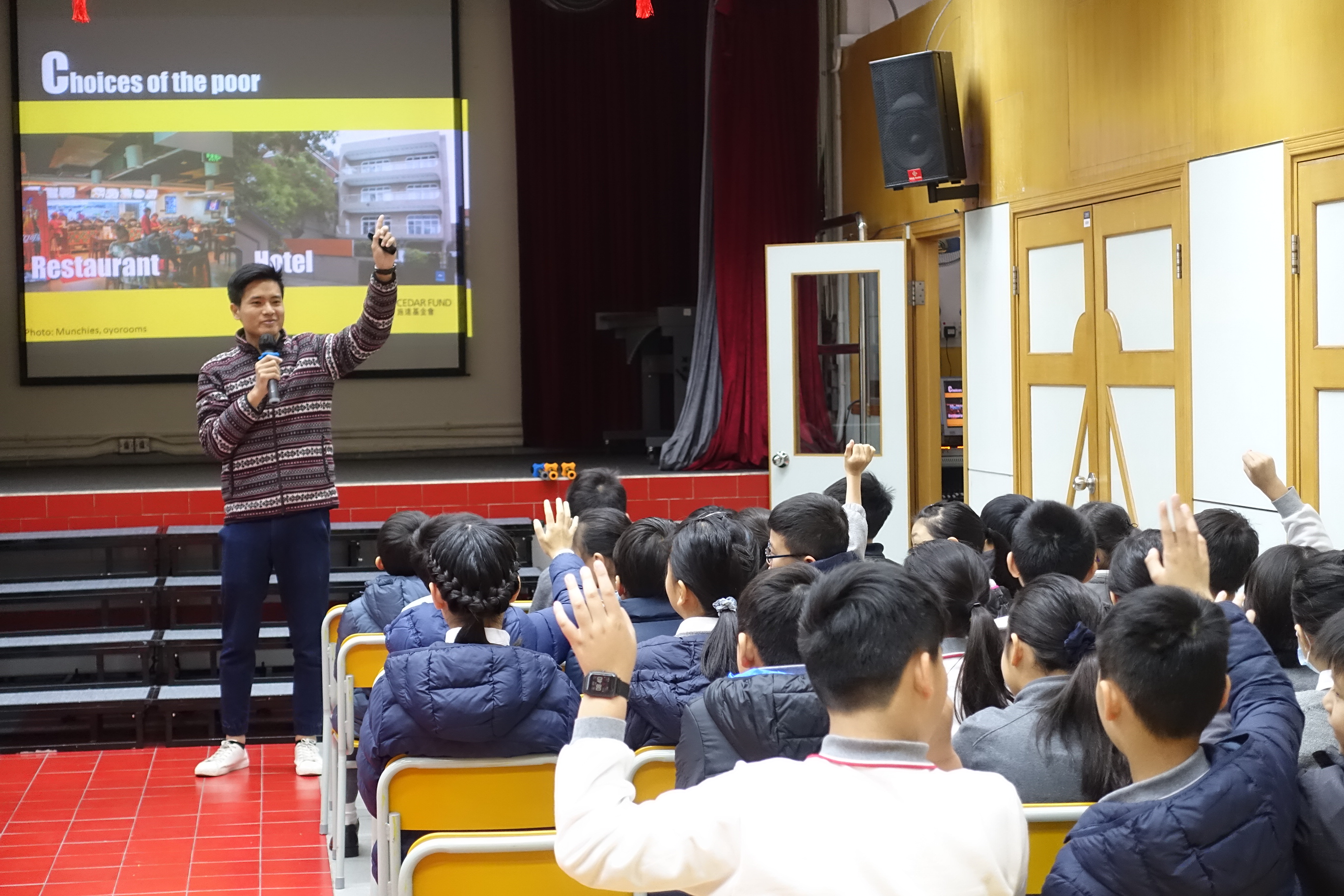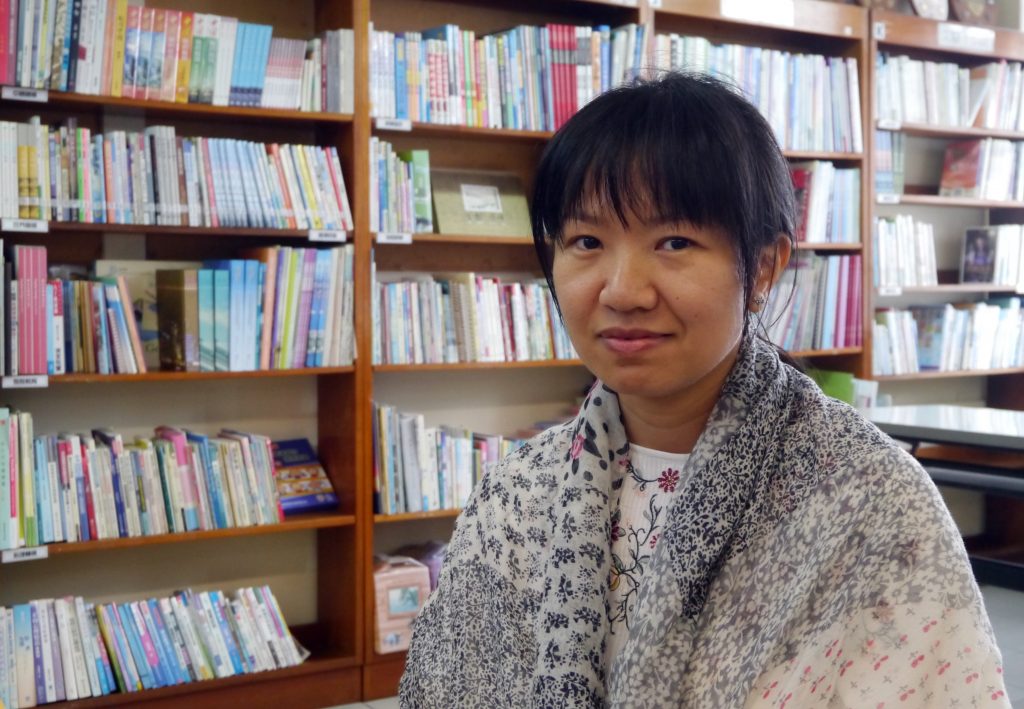(Ms. Jade Lee, CEDAR’s working partner of education ministry in HK)
‘How many human traffickers are there in the world at present?’
‘Apart from Hong Kong, will CEDAR Fund be raising funds for poor children in other places?’

In January this year, CEDAR went to a school under the Direct Subsidy Scheme in Shek Kip Mei to give a talk, which so interested the Primary 5 students in the audience that they raised their hands and asked many questions afterwards. The topic of the talk was ‘Anti-human trafficking’. Our staff explained the definition of human trafficking, talked about how some children in Asia and Africa have been trafficked in the past and described how we can fight this evil trade.
There were about 60 students in the audience and they listened to this topic attentively. At any given time in 2016, an estimated 40 million people around the world had been trafficked and are in modern slavery, of which a quarter were children. Some of these children were forced to work in factories for over 10 hours a day; some were forced to beg on the streets; others were coerced to receive harsh training to become circus acrobats. Some of the young girls were sold to brothels or were forced to marry men. These poor children were subjected to tremendous psychological and physical abuse, and yet they were only about the same age as the students who were listening to the talk.
The content of the talk was undoubtedly depressing. However, it is hoped that with a better grasp of international affairs and the understanding of how CEDAR and its overseas partners’ ministries, which include rescuing children and women from human trafficking, helping the police catch the traffickers, providing the victims with post trauma counselling and vocational training and carrying out human trafficking prevention education in local communities, students in Hong Kong will be able to appreciate how the underprivileged and vulnerable people can be given back their freedom and have their lives transformed. These images will remain with them and act as a source of inspiration in the future.
The 1-hour talk was only one of our attempts to educate the students in this school. Since 2014, CEDAR has been organizing various kinds of poverty alleviation education and fund-raising activities for these students. These events include experiential learning activities through urban slum simulation, barefoot walks and the ‘Red Packet Donation Campaign’. The activities are aimed at broadening the students’ horizons, allowing them to experience the hardship of the underprivileged in the developing countries and offering them an opportunity to help.
The above poverty alleviation education which combines the passing on of knowledge and the nurturing of human compassion is highly valued by the school’s English panel chairperson Ms Jade Lee. In recent years, Ms Lee has been cooperating with CEDAR to introduce an element of moral education in her school’s English Week. Helping her students ‘experience poverty, discover poverty and care about the poverty-stricken’ has become the core theme of the Week.
‘Our students do not really understand poverty’
‘My students are (mostly) from middle-income households, and they do not really understand what it is like to be poor. Some of the senior form students are very self-centred. They live inside their own (online gaming) world and they pay little attention to others,’ said Ms Lee. She had organized a Hunger Banquet in the past to educate her students about poverty and starvation around the world. The students only thought the event ‘fun’, but rarely gained any in-depth insight into the plight and misery of the people living in poverty-stricken countries. Therefore, Ms Lee invited CEDAR to her school and had our staff talk to her students about some poverty-stricken families they had helped. Last year, a campus barefoot walk which simulated human trafficking was held in the school to allow students to gain a little understanding of what it is like to be trafficked into forced labour.
To make the campus barefoot walk more realistic, our staff played the roles of human traffickers and they ‘shouted at’ and ‘scolded’ the students who participated in the activity. Ms Lee estimated that over half of the participating students felt rage and anger because of the ‘bullying’ they were subjected to. ‘I really hope that they can remember this feeling. As a teacher, I can see that it is impossible for my students to experience this kind of dire situation they live in. Through this role play activity, I hope that my students can understand how the poor are being oppressed. What they felt during the role play is part of the poor people’s daily lives,’ Ms Lee said.
A devout Christian, Ms Lee had joined one of her church’s short-term mission trips in the past to go to Myanmar to visit the local orphanages and the poverty-stricken villages. She had witnessed the despondency of the displaced citizens and the helpless children in this little war-ridden Southeast Asian country. She said, ‘Myanmar is not that far away from Hong Kong, and yet it is a world apart. The poor do not even have the basic necessities for their daily lives. Now I’ve been given the opportunity to be involved in the school’s curriculum planning, and I really want to pass on the message of caring for the poor (through the curriculum) and let our students truly experience how the poor live.’
Ms Lee explained why it is important to educate students to care for the poor. Firstly, the students will learn how to be grateful of what they have and understand that they cannot take anything for granted; secondly, students will be encouraged to have compassion for others and understand that many people in this world still live in poverty; thirdly, it is hoped that when the students grow up, they will bring positive changes to the world in due course.
‘Hopefully they can make a difference one day!’ – This is Ms Lee’s aspiration as an educator.
The Bible says, ‘start children off on the way they should go, and even when they are old they will not turn from it.’ (Proverbs 22:6) At CEDAR, we are very thankful to have Ms Lee as a working partner in our education ministry in Hong Kong.
Remarks:
1. CEDAR’s annual ‘Red Packet Donation Campaign’ encourages you to donate one or more of the red packets you received as a token of wish to the poverty-stricken families in other parts of the world. http://cedarfund.org/red_packet/ (Chinese only)
2. CEDAR collaborates with churches and schools to enable Christians and students to learn about the concept of justice in the Bible, integral mission, caring for society and poverty alleviation through various gatherings and activities. We welcome any invitation to visit your organization. http://cedarfund.org/invite-sharing/ (Chinese only)
